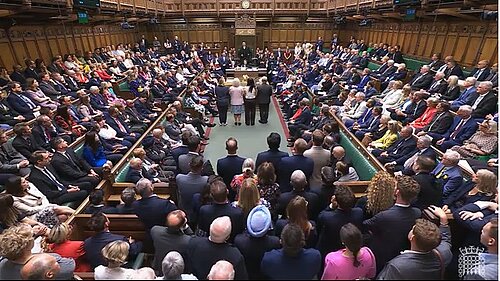Update from Alison Bennett MP on today’s vote on the Terminally Ill Adults (End of Life) Bill

The Terminally Ill Adults (End of Life) Bill returned to the House today for the final stages of the Report Stage and the Third Reading debate at the end of which MPs voted on the Bill.
I voted for the Bill which passed by 314 votes to 291.
This vote does not mean the Bill becomes law today. The Bill will now proceed to the House of Lords who will scrutinise the legislation and send amendments back to the House of Commons for our consideration before it finally receives Royal Assent. We do not know the detailed timescales for this yet.
This was a vote of conscience. No political party whipped their MPs to vote in a particular way and indeed my Liberal Democrat colleagues voted both for and against the Bill.
Throughout this process I have read and considered the moving and thoughtful correspondence from my constituents and met with constituents and local church leaders who oppose the Bill. In Parliament I have engaged with individuals and organisations both supporting and opposing the Bill and given detailed consideration to the Committee Stage deliberations and detailed debate in the House. But ultimately, as this was a conscience vote, I had to come to my own personal decision.
I voted for the Bill because this is a proposal that enables an individual to have control over the manner of their death. I believe that we should all be able to exercise control during our lives. For me, this naturally extends to how one’s own life can end.
Further, in my view giving this choice to those that want it, does not compel those who are opposed to assisted dying to take this option. Importantly, the proposals will not force medical professionals to help a patient take this path if it is counter to their own beliefs, and there are safeguards in the Bill designed to protect more vulnerable people.
Some people have asked me why I would support assisted dying when I should instead support palliative care. I have never thought that we face a choice between palliative care or assisted dying, and I believe there is a compelling argument that the two done well are complimentary. I have met with local hospices and raised the issue of hospice funding with the Secretary of State and, as a member of the All Party Parliamentary Group on Hospices, I will continue to advocate for outstanding hospice and palliative care and for the funding to make hospices financially secure.
Others have mentioned the opposition of the Royal College of Psychiatrists to the Bill. While the College has expressed its position on the Bill, their own survey of members shows that an equal number of psychiatrists support and oppose assisted dying. In recent years many other bodies have moved from opposing assisted dying to a neutral position including the British Medical Association (BMA), the Royal College of GPs, and the Royal College of Physicians in line with the varying views of their members.
Additionally, the BMA has been involved since the outset of the process and provided good insight into the practicalities of the Bill including provisions to support doctors who do not wish to participate in assisted dying. Medical professionals, as with the public, hold a variety of views on the principle and the Bill itself, and while I have read and considered the Royal College of Psychiatrists’ position, I know that many other medical bodies and individual professionals do not share their position.
I know that my decision will be welcomed by some and will be deeply troubling for others. That knowledge sits heavily upon me. I made my decision based upon what both my head and my heart told me was the right thing to do. Please know that I have the utmost respect for those that take a different view to me.
Alison
